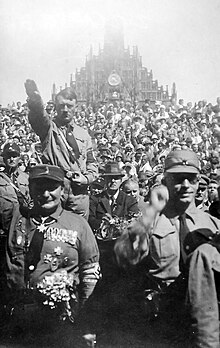Cult of personality: Difference between revisions
| Line 24: | Line 24: | ||
<!-- Please include sources making specific claims of a personality cult for any new entries. --> |
<!-- Please include sources making specific claims of a personality cult for any new entries. --> |
||
The criticism of personality cults often focuses on the regimes of [[Adolf Hitler]], [[Benito Mussolini]], [[Hirohito]], [[Hideki Tojo]], [[Emperor Meiji]], and [[Emperor Taisho]]. |
The criticism of personality cults often focuses on the regimes of [[Adolf Hitler]], [[Benito Mussolini]], [[Hirohito]], [[Hideki Tojo]], [[Emperor Meiji]], and [[Emperor Taisho]]. |
||
We need not give here examples of the loathsome adulation filling this book. All we need to add is that they all were approved and edited by Stalin personally and some of them were added in his own handwriting to the draft text of the book.</blockquote>}} |
|||
[[University of Chicago]] professor [[Lisa Wedeen]]'s book ''Ambiguities of Domination'' documents the cult of personality which surrounded Syrian President [[Hafez al-Assad]]. Numerous examples of his glorification are made throughout the book, such as displays of love and adoration for the "leader" put on at the opening ceremonies of the [[1987 Mediterranean Games]] in [[Lattakia]], [[Syria]]. |
[[University of Chicago]] professor [[Lisa Wedeen]]'s book ''Ambiguities of Domination'' documents the cult of personality which surrounded Syrian President [[Hafez al-Assad]]. Numerous examples of his glorification are made throughout the book, such as displays of love and adoration for the "leader" put on at the opening ceremonies of the [[1987 Mediterranean Games]] in [[Lattakia]], [[Syria]]. |
||
Revision as of 15:29, 30 May 2010
This article includes a list of references, related reading, or external links, but its sources remain unclear because it lacks inline citations. (November 2009) |
This article needs additional citations for verification. (November 2009) |
A cult of personality arises when an individual uses mass media to create an idealized and heroic public image, often through unquestioning flattery and praise.[1] Cults of personality are often found in dictatorships. The sociologist Max Weber developed a tripartite classification of authority; the cult of personality holds parallels with what Weber defined as 'charismatic authority'.
A cult of personality is similar to hero worship, except that it is propagated by mass media. However, the term may be applied by analogy to refer to adulation of religious or non-political leaders.
Background
Throughout history, monarchs were almost always held in enormous reverence. Through the principle of the divine right of kings, rulers were said to hold office by the will of God. Imperial China (see Mandate of Heaven), ancient Egypt, Japan, the Inca, the Aztecs, Tibet, Thailand, and the Roman Empire (see imperial cult) are especially noted for redefining monarchs as god-kings.
The spread of democratic ideas in Europe and North America in the 18th and 19th centuries made it increasingly difficult for monarchs to preserve this aura. However, the subsequent development of photography, sound recording, film and mass production, as well as public education and techniques used in commercial advertising, enabled political leaders to project a positive image like never before. It was from these circumstances in the 20th century that the best-known personality cults arose. Often these cults are a form of Political religion.
Purpose
Personality cults were first described in relation to totalitarian regimes that sought to radically alter or transform society according to radical ideas. Often, a single leader became associated with this revolutionary transformation, and came to be treated as a benevolent "guide" for the nation without whom the transformation to a better future couldn't occur. This has been generally the justification for personality cults that arose in totalitarian societies of the 20th century, such as Adolf Hitler.
Not all dictatorships foster personality cults, and some leaders may actively seek to minimize their own public adulation.
Examples from totalitarian regimes

The criticism of personality cults often focuses on the regimes of Adolf Hitler, Benito Mussolini, Hirohito, Hideki Tojo, Emperor Meiji, and Emperor Taisho.
University of Chicago professor Lisa Wedeen's book Ambiguities of Domination documents the cult of personality which surrounded Syrian President Hafez al-Assad. Numerous examples of his glorification are made throughout the book, such as displays of love and adoration for the "leader" put on at the opening ceremonies of the 1987 Mediterranean Games in Lattakia, Syria.
In a 2004 article on personality cults, The Economist identified Togo's Gnassingbé Eyadéma as maintaining an extensive personality cult, to the point of having schoolchildren begin their day by singing his praises.[2]
Modern use
The modern usage of the phrase "Cult of Personality" focuses much less on direct government control of media and more on individuals who have a large following of people who see said individual as "More than Human". This would be an example of hyperbole, and does not accurately reflect personality cults as they have existed in countries such as Togo, Turkmenistan, and what continues to exist in the Democratic People's Republic of Korea.
See also
References
- ^ Assorted References: cult of personality. (2009). In Encyclopædia Britannica. Retrieved June 25, 2009, from Encyclopædia Britannica Online: http://www.britannica.com/EBchecked/topic/146119/cult-of-personality [1]
- ^ Toughs at the top: The last personality cults. The Economist. December 18, 2004.
External links
- Why Dictators Love Kitsch by Eric Gibson, The Wall Street Journal, August 10 2009
- [2] Living Color - Cult of Personality
